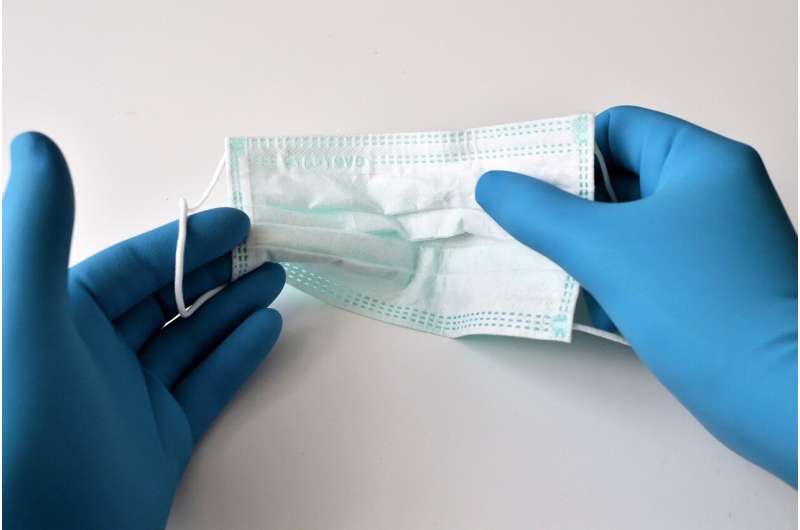
Requirements to wear surgical masks in a large London hospital during the first 10 months of omicron activity (December 2021 to September 2022) made no discernible difference to reducing hospital-acquired SARS-CoV-2 infections, according to new research being presented at this year’s European Congress of Clinical Microbiology & Infectious Diseases (ECCMID) in Copenhagen, Denmark (15–18 April).
Mask wearing has been part of a package of infection control measures employed to reduce COVID-19 in hospitals throughout the pandemic.
The low-tech, low-cost intervention without well-established benefit was reasonable early in the pandemic. However, with a reduction in the severity of COVID-19 disease, in later variants, the risk-benefit balance of masks has been called into question.
To find out more, researchers from St George’s Hospital in south-west London analyzed routinely collected infection control data over a 40-week period between December 4, 2021 (the first week when the omicron variant became dominant) and September 10, 2022 (when universal COVID-19 screening on admission by PCR stopped) to examine hospital-acquired SARS-CoV-2 infections in relation to changes in mask-wearing policies over time.
In the U.K. National Health Service (NHS), a mask mandate for staff was introduced in June 2020, specifying the use of type IIR, fluid-resistant surgical face masks by all staff and visitors. The NHS mask mandate remained in place in clinical areas in hospitals until June 2022—after which decisions about mask policy were entrusted to individual hospitals.
During the first phase of the study (December 4, 2021 to June 1, 2022), all staff and visitors were required to wear masks in both clinical and non-clinical areas of the hospital. Then in phase two, at week 26 (June 2, 2022 to September 10, 2022) the surgical mask-wearing policy was removed for the majority of wards (study group), while a subset of high-risk wards (i.e., renal hematology and oncology wards, the medical admissions unit and intensive care units) retained the mask obligation policy for staff (control group).
The omicron variant was the dominant strain throughout the study period.
The hospital SARS-CoV-2 infection rate was adjusted by the underlying community infection rate identified by routine admission screening.
The analysis found that during a general community surge in SARS-CoV-2 infection in June 2022, removal of the mask policy was not associated with a statistically significant change in the rate of hospital-acquired SARS-CoV-2 infection in the study group—with SARS-CoV-2 infection no higher than the rate when masks were obligatory.
What’s more, the authors did not observe a delayed effect, with no change in the SARS-CoV-2 infection rate during the time when the mask-wearing policy was removed (weeks 26 to 40).
Similarly, the control group who continued wearing masks, found no immediate or delayed change in infection rate.
“Our study found no evidence that mandatory masking of staff impacts the rate of hospital SARS-CoV-2 infection with the omicron variant,” says lead author Dr. Ben Patterson from St George’s University Hospitals NHS Foundation Trust, London. “That doesn’t mean masks are worthless against omicron, but their real-world benefit in isolation appears to be, at best, modest in a health care setting.”
“Many hospitals have retained masking at significant financial and environment cost and despite the substantial barrier to communication,” says senior author Dr. Aodhan Breathnach from St George’s University Hospitals NHS Foundation Trust, London. “We hope this empirical evidence can help inform a rational and proportionate mask policy in health services.”
Source – https://medicalxpress.com/news/2023-04-requirement-masks-hospitals-impact-covid-.html
